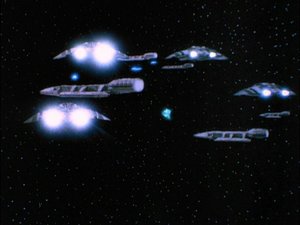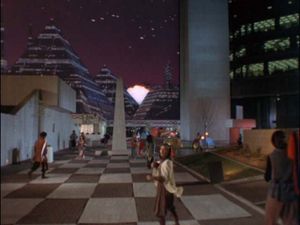Twelve Colonies of Man (TOS-RH)
More actions
| |||||
This article discusses the Twelve Colonies of the Original Series continuation books by Richard Hatch
|
The Twelve Colonies of Man[1] included the colonies of:
Star System
editThe Twelve Colonies of Man are located in an unnamed multi-star system within the Cyrannus Galaxy.
History
editFirst Exodus
editAccording to the Book of the Word, a religious text of the Kobollian faith, humanity began on a planet called Kobol. However, this is untrue, as the font of humanity is referred to solely as Parnassus, and responsible for colonization of man well before Kobol was even settled by the Lords of Kobol.
A thirteenth tribe is said to made another exodus to a planet known as Earth (TOS: "Saga of a Star World"), however it is later revealed to Apollo through Zac that the thirteenth tribe were those of pure Kobollian blood[2], namely the family of Adama, along with Troy and a scant few others in the Fleet (RH: Armageddon).
War
edit

Recent battles in the Thousand Yahren War included the Battle of Cosmora Archipelago (with Commander Kronus, battlestar Rycon and the Fourth Fleet), the Battle of Caprica, and the Battle of Molecay (with the Fifth Fleet and battlestar Pegasus).
The Thousand Yahren War brutally ended with an elaborate Cylon sneak attack at the Battle of Cimtar, which destroys the last battlestar fleet, led by President Adar (TOS: "Saga of a Star World").
One surviving battlestar, Galactica, escapes destruction and is unable to ward off a simultaneous bombardment of the Twelve Colonies and its populace. An innumerable amount of humans are killed. The survivors escape their worlds to follow Galactica in search of a safer haven.
Colonization
edit
Several planets, moons and asteroid colonies throughout the portion of the galaxy familiar to the Colonials boasted small croppings of Colonials. Some who were well aware of the Colonies and the war with the Cylons (TOS: "The Long Patrol", "The Young Lords"), others knew nothing of them, such as Sectar (TOS: "The Magnificent Warriors"), Equellus (TOS: "The Lost Warrior"), Eastern Alliance, Terra, Paradeen and Lunar Colonies (TOS: "Greetings From Earth", "Experiment in Terra").
The Colonies
editAries
editThe colony of Aries is little mentioned, aside from Dalton seeing pictures of a crumbled urban area that was similar to The Pit on Ursus[3] (RH: Armageddon).
Cancer
editCancer is known for its sands[4], as well as its soothing, lulling percussion and windsong[5]. Its people are called Cancerians, and their women are known for their broad, squat bodies[6].
Notable Cancerians
editCaprica
editCaprica is a colony of great influence within the Twelve Colonies of Kobol, primarily stemming from the Kobollian leadership that has been in place since the colony's founding[7]. However, Caprica had an aboriginal people known as the Borellian Nomen, and while the Kobollians successfully settled Caprica, the Nomen tribes remained displaced causing further issues between the two peoples[8] (RH: Armageddon).
Capricans often honor the deceased by paying their respects privately before the formal funeral[9] (RH: Armageddon).
Caprica is a planet possessing tarpits, a form of quicksand that the Nomen avoided with great care[10] (RH: Armageddon).
In addition to native wildlife, heffala berries are known to have originated from Caprica (RH: Armageddon).
Notable Capricans
editGemini
editGemini is the colony of the Gemons, who are known for their ethereal quality, and thus their "divergent evolution" from their thinner air and brighter sun summoned qualities of increased height, litheness and pale complexion[12] (RH: Armageddon).
Up until the destruction of the colony in 7342, Gemini was a well-established patriarchal society. In the yahrens following, a special interest group known as the Gemon Matriarchs arose, believing women to be far more capable than men when it came to leadership[12] (RH: Armageddon).
Notable Gemons
editLeonis
editLeonis is a colony in close proximity to its sun. Following the settlement of the planet, the humans who made Leonis their home began to undergo "divergent evolution," meaning that the skin pigmentation altered toward the darker end of the spectrum[12] (RH: Armageddon).
Denizens of Leonis are known as Leonids[17]. Up until Tigh's appointment in 7360, no Leonid had been president of the Council of the Twelve[17] (RH: Armageddon).
Cultural artifacts surviving the destruction of the colony in 7342 include an unnamed ballad, which Boomer listens to following the funeral of Commander Adama[18] (RH: Armageddon).
Notable Leonids
editLibra
editOne of the twelve colonies, of which little is known. Its denizens are referred to as Librans[20] (RH: Armageddon).
Sagittarius
editSagittarius is a colony whose denizens are known as Sagittarians[21] (RH: Armageddon).
In 7360, a Sagittarian cult known as the Cult of the Serpent consolidated its power on Ursus[21] (RH: Armageddon)
Notable Sagittarians
editScorpius
editScorpius is a colony whose denizens are known as Scorpions, whose pallor and light fur were results of "divergent evolution" to adapt to the planet's distance from the sun and the resultant colder climate[12] (RH: Armageddon).
Prior to the arrival of settlers from Kobol, the Borellian Nomen were discovered and described as an aboriginal race, whose bulk and physicality, including the increase in body hair that made them "almost lupine," were attributed to a similar divergent evolution[12] (RH: Armageddon).
A ship in the Fleet, Scorpius Ascendant, is named after the colony[24] (RH: Armageddon).
Notable Scorpions
editTauron
editTauron is a colony whose denizens are known as Taurans, whose red-tinged skin and dark hair were identifiable physical characteristics[27] (RH: Armageddon).
Notable Taurans
editNotes
edit- Armageddon does not make mention of two colonies, those relating to the signs of Aquarius and Virgos.
References
edit- ↑ In the Original Series, the formal name of the unified worlds is the "Twelve Colonies of Man". Its Re-imagined Series counterpart is known as the "Twelve Colonies of Kobol".
- ↑ Hatch, Richard; Golden, Christopher (1997). Armageddon. Byron Preiss, p. 154.
- ↑ Hatch, Richard; Golden, Christopher (1997). Armageddon. Byron Preiss, p. 137.
- ↑ Hatch, Richard; Golden, Christopher (1997). Armageddon. Byron Preiss, p. 205.
- ↑ Hatch, Richard; Golden, Christopher (1997). Armageddon. Byron Preiss, p. 157.
- ↑ 6.0 6.1 6.2 Hatch, Richard; Golden, Christopher (1997). Armageddon. Byron Preiss, p. 75.
- ↑ Hatch, Richard; Golden, Christopher (1997). Armageddon. Byron Preiss, p. 54.
- ↑ Hatch, Richard; Golden, Christopher (1997). Armageddon. Byron Preiss, p. 43.
- ↑ Hatch, Richard; Golden, Christopher (1997). Armageddon. Byron Preiss, p. 19.
- ↑ Hatch, Richard; Golden, Christopher (1997). Armageddon. Byron Preiss, p. 45.
- ↑ Hatch, Richard; Golden, Christopher (1997). Armageddon. Byron Preiss, p. 184.
- ↑ 12.0 12.1 12.2 12.3 12.4 12.5 Hatch, Richard; Golden, Christopher (1997). Armageddon. Byron Preiss, p. 38.
- ↑ Hatch, Richard; Golden, Christopher (1997). Armageddon. Byron Preiss, p. 101.
- ↑ Hatch, Richard; Golden, Christopher (1997). Armageddon. Byron Preiss, p. 277.
- ↑ Hatch, Richard; Golden, Christopher (1997). Armageddon. Byron Preiss, p. 162.
- ↑ Hatch, Richard; Golden, Christopher (1997). Armageddon. Byron Preiss, p. 39.
- ↑ 17.0 17.1 17.2 Hatch, Richard; Golden, Christopher (1997). Armageddon. Byron Preiss, p. 24.
- ↑ 18.0 18.1 Hatch, Richard; Golden, Christopher (1997). Armageddon. Byron Preiss, p. 31.
- ↑ Hatch, Richard; Golden, Christopher (1997). Armageddon. Byron Preiss, p. 204.
- ↑ Hatch, Richard; Golden, Christopher (1997). Armageddon. Byron Preiss, p. 201.
- ↑ 21.0 21.1 Hatch, Richard; Golden, Christopher (1997). Armageddon. Byron Preiss, p. 139.
- ↑ Hatch, Richard; Golden, Christopher (1997). Armageddon. Byron Preiss, p. 193.
- ↑ Hatch, Richard; Golden, Christopher (1997). Armageddon. Byron Preiss, p. 140.
- ↑ Hatch, Richard; Golden, Christopher (1997). Armageddon. Byron Preiss, p. 42.
- ↑ Hatch, Richard; Golden, Christopher (1997). Armageddon. Byron Preiss, p. 36.
- ↑ Hatch, Richard; Golden, Christopher (1997). Armageddon. Byron Preiss, p. 276.
- ↑ 27.0 27.1 Hatch, Richard; Golden, Christopher (1997). Armageddon. Byron Preiss, p. 71.

